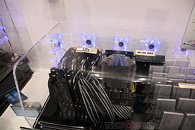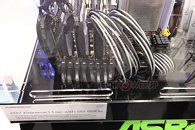- Joined
- Oct 9, 2007
- Messages
- 47,775 (7.41/day)
- Location
- Dublin, Ireland
| System Name | RBMK-1000 |
|---|---|
| Processor | AMD Ryzen 7 5700G |
| Motherboard | Gigabyte B550 AORUS Elite V2 |
| Cooling | DeepCool Gammax L240 V2 |
| Memory | 2x 16GB DDR4-3200 |
| Video Card(s) | Galax RTX 4070 Ti EX |
| Storage | Samsung 990 1TB |
| Display(s) | BenQ 1440p 60 Hz 27-inch |
| Case | Corsair Carbide 100R |
| Audio Device(s) | ASUS SupremeFX S1220A |
| Power Supply | Cooler Master MWE Gold 650W |
| Mouse | ASUS ROG Strix Impact |
| Keyboard | Gamdias Hermes E2 |
| Software | Windows 11 Pro |
ASRock Z87-Extreme11/ac motherboard can connect to no less than 22 drives over its six SATA 6 Gb/s, and sixteen SAS3 ports, so why not show it off? It's just that ASRock chose 22 Plextor M5 Pro SSDs, which make for a creepy cemetery-like sight. Sadly, they couldn't give us performance numbers because the 22 drives aren't exactly striped across in any RAID configuration, but at least you know you can take something like this to your next Left4Dead LAN, and pull crowds. It's not just the drives, ASRock also fitted the board with four Radeon HD 7970 cards in CrossFireX, maxed out the memory, and wired the board to its Wi-SD box accessory, a 3.5-inch front-panel that features the board's WiFi+Bluetooth antenna, a couple of USB 3.0 ports, and a multi-format card reader.



View at TechPowerUp Main Site



View at TechPowerUp Main Site





